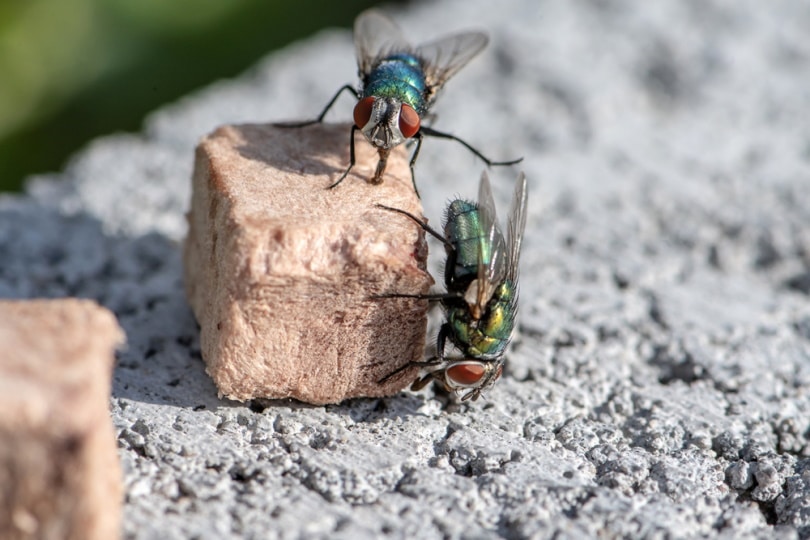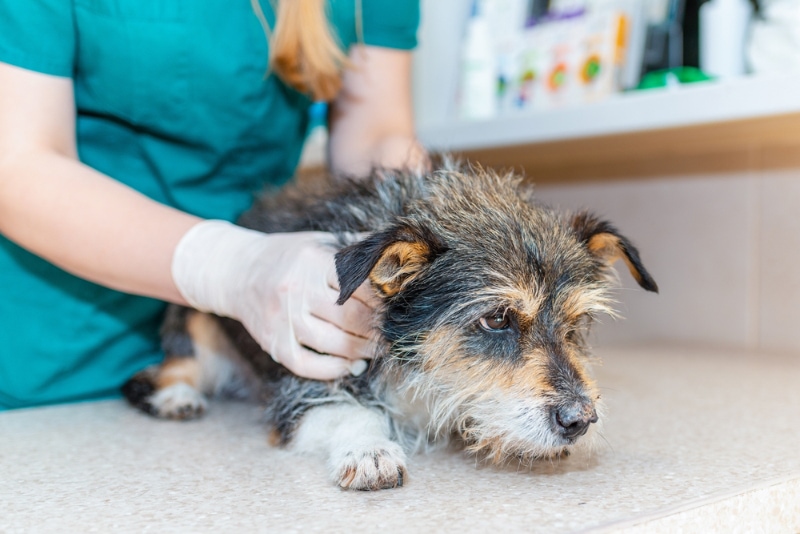
Click to Skip Ahead
Warmer weather means more trips to dog parks and long walks in the sunshine. However, it may also mean being bothered and bitten by black flies.
Fortunately, black flies are pesky but rarely a thing to worry about. While these black fly bites can be a nuisance for humans, they don’t typically bother dogs too much. The bites usually go away on their own in about a week without requiring any medical attention. However, knowing what to look out for and how to prevent future bites is still essential. So, keep reading to learn about these troublesome flies, their bites on dogs, and some helpful tips for treating and avoiding them.
What are Black Flies?
These tiny creatures, also known as buffalo gnats or gnats, tend to congregate near flowing water since it plays an integral role in their reproductive cycle. Black flies are typically around 1/16 inch long and have a robust body with a dark hue, tiny legs, and broad wings.
Black flies are most commonly found in humid and forested regions. They love the warmer months and are most active from spring to early fall. But here’s the thing: they have a terrible reputation. Adult black flies feed on the blood of mammals.
The good news is that black fly bites on dogs are usually not a big deal. They can cause some itching and discomfort, but they’re typically not severe. So, if you’re out and about with your furry friend and notice some black flies buzzing around, don’t worry too much—just keep an eye on them and enjoy your adventure.

How to Recognize Dog Black Fly Bites
These bites are usually spotted on your furry friend’s belly, appearing as tiny red dots or sometimes as red circular rings. Unlike other insect bites, black fly bites are usually not accompanied by crusty skin or intense itching.
When Do You Need to Worry?
We all love spending time outdoors with our furry friends, but pesky black fly bites can put a damper on the fun. While most bites can be treated at home, sometimes it’s best to seek professional veterinary care. Black fly bites usually don’t itch and will go away on their own, but your pup might get curious and start licking or scratching, which can cause discomfort.
If you notice the bites getting worse or your dog scratching excessively, it’s time to call a vet. Your vet can give you advice and prescribe treatment options to help your furry friend feel better. Look out for allergic reactions such as hives, facial swelling, or intense itchiness. These reactions are rare but can occur, so be sure you know what to look for. If you see any of these signs, contact your vet immediately.

How to Treat Black Fly Bites on Dogs
Has a pesky fly bitten your furry friend? Although it might not be a life-threatening situation, it can definitely make your dog feel uncomfortable. Your dog might scratch or lick the affected area excessively, causing even more discomfort. But don’t worry. Here are some helpful tips on how to treat those bothersome bites.
Start by gently cleaning the area with warm, soapy water. If the bite has scabbed over, use a warm compress to soften it before cleaning. After consulting your vet, apply a dog-safe ointment or balm to promote healing. For the best results, keep your dog indoors for a while to prevent the wound from getting dirty or the ointment from rubbing off. Using a cold compress can also help relieve itch as a first aid measure.
How to Stop Flies from Biting Dogs
First and foremost, it’s crucial to maintain a clean environment for your dog. This means promptly cleaning up any animal feces in your yard, cutting back dense brush, removing standing water, and removing any rotting yard debris.
Black flies are most active a couple of hours after sunrise and a couple of hours before sunset. That’s why limiting outdoor activities to daylight hours is a good idea. It will help reduce the risk of your dog getting bitten and give you both a chance to enjoy the outdoors without the annoyance of black flies.
Lastly, if you want to take extra precautions, you may choose to cover your dog with a light layer of protective clothing. For example a light jacket or t-shirt will cover the most commonly bitten areas. Just make sure your dog doesn’t overheat.
Conclusion
Black flies are more annoying than they are dangerous. Even though most black fly bites will heal on their own, be sure to have your vet check out any bites that continually get worse or that your dog is bothered by. You can try to prevent black fly bites on your dog by avoiding wet, wooded areas, especially during the warmer months and in the early hours of the morning or the time around dusk.
Featured Image Credit: TamaraLSanchez, Shutterstock






